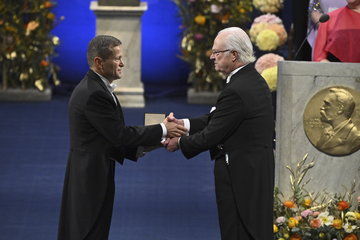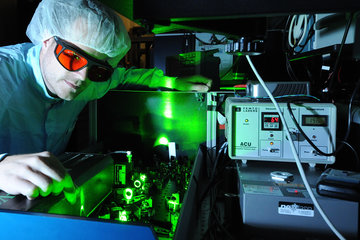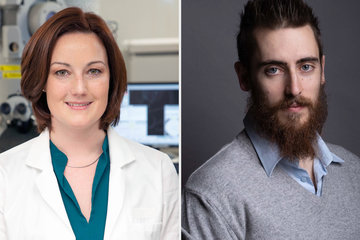Max Planck-Humboldt Research Award 2023
Rotem Sorek receives the Max Planck-Humboldt Research Award 2023 and Amy Buck and Kandice Tanner are honoured with Max Planck-Humboldt Medals
Rotem Sorek will receive the Max Planck-Humboldt Research Award 2023, which is presented together with 1.5 million euros in prize money, in acknowledgement for his research into bacterial defence mechanisms against viruses.The researcher from the Weizmann Institute of Science in Israel has discovered that bacteria have a complex immune system, from which components of the human immune system originate. The prize money will fund a joint research project with researchers from the Helmholtz Institute for RNA-based Infection Research in Würzburg and the Ludwig Maximilians University of Munich, in which key mechanisms of the bacterial and human immune systems will be investigated. The Max Planck-Humboldt Medal will be awarded to Amy Buck from the University of Edinburgh for her research into inter-species communication via RNA and Kandice Tanner from the Center for Cancer research, NCI NIH, for developing methods of analysing the biophysical properties and behaviour that dictate the metastatic spread of cancer cells. The Max Planck-Humboldt Research Award will be formally presented on November 29, 2023 in Berlin.

Defence against pathogens or dangerous foreign substances is essential for all life forms. In their respective environments they are constantly subjected to various influences, which can threaten their survival. More complex life forms, such as humans, have consequently developed a comprehensive immune system out of a network of defence mechanisms during the course of evolution. Bacteria, too, have a type of immune system that they use to defend themselves against viruses, also known as phages.
When these phages infect bacteria, they introduce their genetic material into the microbes. The mass reproduction of the virus ultimately leads to the death of the bacterial cells. How bacteria defend against phages is not only relevant to basic research; this knowledge has a wide variety of applications. For example, the CRISPR-Cas system, which bacteria use to defend themselves against invading viruses, is being further developed and utilised as a type of "genetic scissors" in the field of genetic engineering.
How bacteria defend against viruses
Rotem Sorek has discovered that the defence mechanisms in bacteria extend far beyond the CRISPR-Cas system. Inside the genetic material of thousands of different bacteria, he systematically looked for anti-phage defence systems and, in so doing, discovered a variety of defence mechanisms that function like an immune system for the protection of the bacteria. Many of these form the origin of defence functions present in the human immune system.
For these research achievements, Rotem Sorek is now being presented with the Max Planck-Humboldt Research Award 2023. Sorek obtained his doctorate in human genetics at the University of Tel Aviv and then undertook a research residency at the University of California, Berkeley. In 2008 he came to the Weizmann Institute of Science in Rehovot, Israel, where he is currently Professor of Molecular Genetics.
The research award, which is presented along with 1.5 million euros in prize money, enables exceptional scientists from abroad to undertake a research project in Germany.
Sorek will research key mechanisms of bacterial and human immune systems. To this end, he will partner with Jörg Vogel from the Helmholtz Institute for RNA-based Infection Research at the University of Würzburg and Veit Hornung from the Ludwig Maximilians University of Munich. Together, the researchers intend to identify hitherto unknown antiviral defence strategies of the human immune system with the help of bacterial anti-phage defence mechanisms, which could be used in new therapies for treating infections.
Inter-species RNA communication
Amy Buck has been awarded one of the Max Planck-Humboldt Medals. The Professor at the Institute for Immunology and Infection Research at the University of Edinburgh is researching the role of RNA in the communication in the mammalian gut. Her experiments show that parasitic nematodes in the gastro-intestinal tract of mice secrete vesicles containing RNA, which are internalized by the intestinal cells of the host animals to alter the immune response. Fungi and bacteria also transfer RNA to host cells in order to alter them.
These discoveries by Amy Buck have shaped the field of inter-species communication via RNA. This could form the basis for novel tools to deliver RNA drugs to cells as well as therapies, which interfere in the communication between pathogen and host.
The biophysics of the metastatic spread of cancer
The second Max Planck-Humboldt Medal has been awarded to the physicist Kandice Tanner, Senior Investigator at the Center for Cancer Research, National Cancer Institute, National Institutes of Health in Bethesda.
Using 3D organoid models of cancer progression, Tanner discovered a novel type of cell migration and cell generated forces associated with the formation of microtissues and tumours. She found out that in zebrafish biophysical properties of the blood vessels that these cancer cells encountered during spread influenced the cells’ ability to preferentially colonize the brain or the bone marrow niche. This finding is important for the use of personalized medicine because some treatments may be effective in one organ but less so in another. Moreover, it also supports the concept that therapeutics influencing the biophysical properties of cells and tissues could help to treat malignancies.
About the award
The Max Planck Society and the Alexander von Humboldt Foundation present the Max Planck-Humboldt Research Award, along with 1.5 million euros in prize money, to a researcher from abroad. 80,000 euros in personal prize money is also awarded.
The focus here is on personalities whose work is characterised by outstanding potential for the future. The prize is intended to attract particularly innovative scientists working abroad to spend a fixed period of time at a German higher education institution or research facility. The Federal Ministry of Education and Research provides the funding for the award.
The focus of the award alternates each year between natural and engineering sciences, life sciences, humanities and social sciences. In addition, one or two further individuals may be nominated and awarded the Max Planck-Humboldt Medal. This is awarded along with 60,000 euros in prize money.












